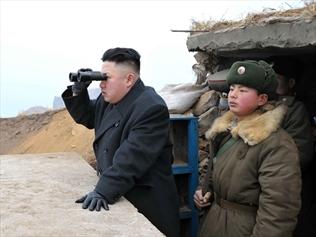
North Korea puts rockets on standby
Giles Hewitt

North Korea's leader has ordered preparations for strategic rocket strikes on the US mainland. Source: AA
NORTH Korean leader Kim Jong-Un on Friday ordered missile units to prepare to strike US mainland and military bases, vowing to "settle accounts" after US stealth bombers flew over South Korea.
The order came after US Defense Secretary Chuck Hagel, with tensions soaring on the Korean peninsula, said Washington would not be cowed by Pyongyang's bellicose threats and stood ready to respond to "any eventuality".
Kim directed his rocket units on standby at an overnight emergency meeting with top army commanders, hours after nuclear-capable US B-2 stealth bombers were deployed in ongoing US joint military drills with South Korea.
In the event of any "reckless" US provocation, North Korean forces should "mercilessly strike the US mainland... military bases in the Pacific, including Hawaii and Guam, and those in South Korea", he was quoted as saying by the official Korean Central News Agency (KCNA).
While North Korea has no proven ability to conduct such strikes, Kim said: "The time has come to settle accounts with the US imperialists."
The youthful leader argued that the stealth bomber flights went beyond a simple demonstration of force and amounted to a US "ultimatum that they will ignite a nuclear war at any cost".
A South Korean military official quoted by Yonhap news agency said a "sharp increase" in personnel and vehicle movement had been detected at the North's mid- and long-range missile sites.
The defence ministry declined to confirm the report, saying only that all strategic sites in the North were under intense South Korean and US surveillance.
The B-2 flights, which followed training runs by B-52 bombers, were part of annual drills between the United States and South Korea, which North Korea each year denounces as rehearsals for war.
Pyongyang has been particularly vocal this time, angered by UN sanctions imposed after its long-range rocket launch in December and the third nuclear test it carried out last month.
Kim's order formalised steps already taken by the Korean People's Army (KPA), which put its strategic rocket units at combat-ready status on Tuesday. The following day it cut the last remaining military hotline with South Korea.
Tens of thousands of North Korean soldiers and civilians held a huge rally and march in Pyongyang on Friday, in support of a possible military strike against the United States.
State television said the rally took place to support the decision to put the country's strategic rocket units on a war footing.
China, North Korea's sole major ally and biggest trading partner, appealed for calm and said "joint efforts" were needed from all parties to prevent the situation deteriorating further.
The bulk of the threats emanating from Pyongyang have been dismissed as bluster. North Korea has no confirmed missile capability to reach the US mainland - or indeed Guam or Hawaii in the Pacific.
But Washington has opted to match the threats with its own muscle-flexing.
"We will be prepared - we have to be prepared - to deal with any eventuality," Hagel told reporters at the Pentagon.
"We must make clear that these provocations by the North are taken by us very seriously and we'll respond to that," Hagel said.
